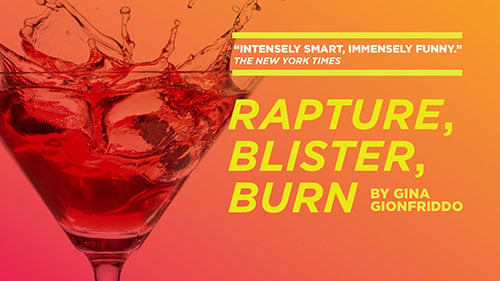
From left to right: Stephanie Bignault (Avery), Joan Porter (Alice), Amy Herzberg (Catherine), and Jonny Schremmer (Gwen) in T2’s production of Rapture, Blister, Burn.
Photo by Beth Hall
As playwright Gina Gionfriddo’s “Rapture, Blister, Burn” comes to a close, there is a nice sense of tidiness. Glasses clink, three toasts are offered and the characters all have what might be a path forward.
It’s a relief, considering the messes that unfolded the previous two hours onstage.
“Rapture, Blister, Burn,” which runs through April 24 at Nadine Baum Studio courtesy of local theater company TheatreSquared, was a finalist for the Pulitzer Prize for Drama in 2013. Crisp dialogue runs throughout the show, and it crackles with the occasional great one liner. It’s a play about yearning for a different future, and also about complicated things like mothers and daughters, alcohol dependency, feminism, academia, pornography and the definition of a family. It’s much funnier than that line-item description would suggest.

What: TheatreSquared’s “Rapture, Blister, Burn”
When: Wed-Sun through April 24
Where: Nadine Baum Studios, Fayetteville
Cost: $15-$45
Tickets: 479-443-5600 or theatre2.org
The play introduces us to Catherine (played by TheatreSquared co-founder Amy Herzberg) a scholar and academic cool enough for “The Daily Show” generation. Her research, which has earned her a television appearance or two, delves into the pop culture responses to wars and other traumas. She’s labeled as “the hot doomsday scholar.”
The opening scene of TheatreSquared’s production finds Catherine in a situation she awkwardly suggested while drunk a few weeks ago. She’s standing in the backyard of her former best friend, Gwen (played by Jonny Schremmer). It’s also the backyard of her former boyfriend Don (played by Michael James Reed). Gwen and Don started their relationship when Catherine left for London, and they’ve been together long enough to have a teenage son. There’s been little to no contact between Catherine and the Harper family in those intervening years. But things pick up quickly as everyone realizes there’s something in the others they wish they had for themselves. Catherine, the powerful feminist thought leader, yearns for a family her academic career didn’t allow. Gwen pines for the scholarly success she stopped pursuing to raise a family. Don wants a spark of inspiration after drifting somewhere in the middle of those two worlds. In true post-modern style, none of them are completely likeable, and it’s hard to find a rooting interest.
Catherine takes a sabbatical to return to her hometown, in part because her mother, Alice (played by Joan Porter), has recently suffered a heart attack but perhaps just as much so to examine her past and the consequences of her career decisions. Don, a dean at a local college, finds her a teaching job, and hastily assembles a summer session for her to teach. That summer class includes only two students – Gwen, who has suddenly decided to return to school, and the Harper’s 21-year-old baby sitter, Avery (played by Stephanie Bignault), recently fired from that role after showing up with a black eye.
The trio starts class anyway, with Catherine leading a lecture that serves the viewer as a short course in feminist history, name dropping scholars along the way. “Rapture, Blister, Burn” is at times a very academic show. This all takes place in the front room of Alice’s home, where Catherine is staying. It’s a deceptively simple aesthetic crafted by TheatreSquared to capture all this, but an effective one. Major set pieces move inventively to create the world, and the interior of Alice’s home looks lived-in. That’s a credit to TheatreSquared.
Alice enters the conversation periodically to provide her generational perspective on the matters at hand but also to ply everyone with martinis. Eventually everyone opens up, even Gwen, who no longer drinks but goes along with the nontraditional course structure – taught by her husband’s ex-lover, no less – and has a few Shirley Temples. The women quickly unveil their fears and dreams to each other, perhaps a little more quickly than I believe they might have in real life. We get into some very raw emotions very fast in “Rapture, Blister, Burn.”
When the second act picks up the messes made in the first half, roles are reversed, some literally, some figuratively. Catherine attempts for the family she wished she’d tried decades ago. Gwen takes a chance on school, and Don stays in the middle. Again.
Avery, the youngest of the group, with many more important life decisions still ahead of her than behind her, becomes somewhat of the teacher, particularly to an exasperated Catherine.
“You don’t have a misspent life!” Avery implores.
“Oh, but I might,” Catherine retorts.
There’s sparsely any such gray matter in Gionfriddo’s script – you can’t have it all in the world outlined here. Catherine couldn’t have a family because she chose academia. Gwen couldn’t have a career because she made family a priority. And their actions don’t leave us much hope for anything more. Don, perhaps influenced by marijuana, excitedly brings in a leaf from outside that’s half green and half yellow at the turn of the season. He hopes it means there’s an opportunity for change, because right now, he’s tried to have a career and a family and he’s not doing particularly well in either endeavor. No one gets everything they want in “Rapture, Blister, Burn.”
What never changes, no matter our station, is that we all lead messy, convoluted lives. “Rapture, Blister, Burn” knows this, too. Sometimes, feminist scholars are, as her mother tells her, “a bad feminist.” Sometimes, love hurts. And sometimes, a new direction takes us right back to where we were at the start. Maybe we all get what we deserve after all.

